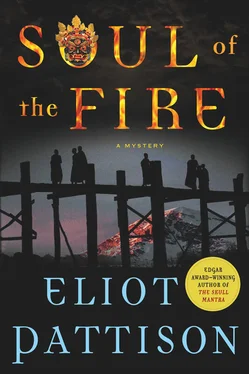Eliot Pattison - Soul of the Fire
Здесь есть возможность читать онлайн «Eliot Pattison - Soul of the Fire» весь текст электронной книги совершенно бесплатно (целиком полную версию без сокращений). В некоторых случаях можно слушать аудио, скачать через торрент в формате fb2 и присутствует краткое содержание. Год выпуска: 0101, ISBN: 0101, Издательство: St. Martin, Жанр: Полицейский детектив, на английском языке. Описание произведения, (предисловие) а так же отзывы посетителей доступны на портале библиотеки ЛибКат.
- Название:Soul of the Fire
- Автор:
- Издательство:St. Martin
- Жанр:
- Год:0101
- ISBN:9781250036476
- Рейтинг книги:4 / 5. Голосов: 1
-
Избранное:Добавить в избранное
- Отзывы:
-
Ваша оценка:
- 80
- 1
- 2
- 3
- 4
- 5
Soul of the Fire: краткое содержание, описание и аннотация
Предлагаем к чтению аннотацию, описание, краткое содержание или предисловие (зависит от того, что написал сам автор книги «Soul of the Fire»). Если вы не нашли необходимую информацию о книге — напишите в комментариях, мы постараемся отыскать её.
Soul of the Fire — читать онлайн бесплатно полную книгу (весь текст) целиком
Ниже представлен текст книги, разбитый по страницам. Система сохранения места последней прочитанной страницы, позволяет с удобством читать онлайн бесплатно книгу «Soul of the Fire», без необходимости каждый раз заново искать на чём Вы остановились. Поставьте закладку, и сможете в любой момент перейти на страницу, на которой закончили чтение.
Интервал:
Закладка:
Why was he here? he asked himself for the hundredth time. Who had arranged for him to be snatched from his ditches and thrown into this swamp of politics and violence? Sung had hinted at an answer. I told them the old dinosaur was crazy, Sung had said when speaking of Shan’s appointment.
He absently paced along the rooftop, watching with a melancholy grin as a falling star shot across the horizon. Then he turned toward the north, and a cold hand gripped his heart. Longtou Prison too was washed in moonlight, but its searchlights slashed into the night, battling the stars.
Lokesh had spent more than half his life in prisons. He knew how to survive, though his instincts often had little to do with survival. In their hard labor camp, he had organized inmates into chanting groups, driving away despair with old mantras and invocations of the earth deities who watched over the dangerous mountain roads where they were forced to work. In those days, when the guards discovered him breaking the rules, they would drag him away to solitary confinement for a month. Today, at a place like Longtou, guards would respond with batons and tasers. Shan had met an old Tibetan who had been repeatedly tortured with electric cattle prods. The man had forgotten his own name, forgotten how to put sentences together, and just sat in a corner, drooling and staring at his beads.
He picked a window at the corner of the largest prison building and pretended Lokesh was behind it, then directed soft mantras toward it. Lokesh had taught him that such mantras should focus him, should calm him, should banish anxiety. But as he chanted, he found his fists clenching. He was angry, he was frightened, he was tormented by the certainty that Lokesh was suffering because of him.
After several minutes, his voice cracked and he fell silent.
At first he thought he had heard a murmuring echo, but when the sound continued, he turned and ventured in its direction.
The two dim shapes wrapped in blankets might have been lost in the shadows were they not silhouetted against the adjoining building. The woman was singing in a low, almost whispering voice. The man was playing a harmonica. Their song became vaguely familiar as Shan approached, but he did not recognize it until he was a dozen feet away.
“Beautiful dreamer, beckon to me,” the American woman sang softly toward the night sky, then suddenly gasped as she saw Shan.
Judson hesitated only a moment. “Rest easy, Hannah, it’s only Comrade Shan. Have a sit, brother, and try some of my bourbon. We can teach you the words of our song.”
Shan declined the extended bottle but stepped to Judson’s side. “The songs of Stephen Foster are well known in China. You slipped your handlers.”
“You slipped your handler,” Judson repeated back to Shan, slightly slurring the words.
Shan shrugged. “Ex-convicts are the ghosts of modern Tibet. We are creatures of air and shadow. Once other Chinese know who you are, they tend to look right through you, like they don’t even see you. We are not of any substance, and we never last long. We appear and disappear all the time, just a mirage of a person, which can evaporate with the slightest breeze. But when Americans disappear,” he added after a moment, “the entire iceberg can collapse.”
“Iceberg?” the American woman asked. Her voice was hoarse, as if she had been crying, and before she turned to Shan, she dabbed at her eyes.
“I helped organize watcher teams for foreigner visitors in the early days of Westernization,” Shan explained. “We usually had teams of six agents on surveillance for every American. Now it’s done only for special cases. Americans serving on a Chinese commission would be very special cases. When your affable hosts go off duty, they report back to a bigger team, who will debrief with them for an hour or two every day. For every one you can see, there will be three or four below the surface.”
Judson seemed unconcerned. “Comrade Tuan is with Religious Affairs, Major Sung wears a Public Security uniform, Madam Choi likes to speak nostalgically about her reeducation in the rice paddies but she got drunk one night and boasted that she had graduated from the special Public Security academy reserved for those expected to become senior diplomats. Kolsang is one of the rare Tibetans with Party membership. Herr Vogel is desperately trying to impress his hosts because he thinks they are going to persuade his bosses back home to make him the next ambassador in Beijing.”
Shan gazed at the American in surprise. “You too have much below the surface, Mr. Judson.”
Judson shrugged. “In China, you learn a whole new way of watching people.”
“What are you doing up here?” Shan asked.
“Taking the air. Watching the sky. We used to watch for the aurora back in the Colorado mountains, but the night sky has a different quality here. We were marveling at how even a gulag prison can become a temple under a Tibetan moon.”
Shan stared at the couple in surprise. “You knew each other before coming here?”
Judson grimaced and stared at the bottle, as if blaming the bourbon for speaking too freely. “We did,” he admitted. “Professional colleagues at the UN.”
“Who went to see the northern lights in Colorado.”
Hannah Oglesby looked up at Shan. “A long time ago,” she said, as if her relationship with Judson had changed. She gestured toward the prison. “What was it like? I mean, before it was Longtou.”
“It was a temple, or more like twenty or thirty temples in one compound,” Shan explained. “Sungpa Abbey was one of the largest in Tibet. Two or three thousand monks. It hosted a school of medicine. Its printing press was renowned for its illuminated manuscripts. There was a prisoner in my barracks who had saved a few pages from a book printed there. He had secretly sewn them inside his shirt. On festival days, he would take them out to show us. To the old lamas, they may as well have been relics from one of the ancient saints.”
“Tell us,” the American woman asked in the tone of an eager novice. “Tell us what the pages looked like, what they said.”
Shan considered the two, not for the first time wondering why they had agreed to join the Commission, then he stepped to the edge of the roof, facing the prison for a few heartbeats before he turned and knelt in front of them. “The pages of a peche, a Tibetan manuscript, are long and narrow, each printed with a hand-carved wooden block on parchment pages. They are often very simple, with nothing but script, but those from Sungpa were illuminated with beautiful images around the margins. Little yaks playing with tigers, dakini goddesses, ritual symbols. The pages we had were all poems of ancient lamas. ‘Who thinks of death,’ the first line of one said, ‘until it arrives like thunder.’ There was another that spoke of the importance of even the most insignificant lives. ‘The smallest spark can burn down a mountain.’”
Strangely, the American woman reacted with a contented smile and Judson extended the bottle to her. She refused it, just drew her knees up against her chest and gestured for more from Shan. He searched his memory and offered half a dozen other examples, then spoke further about the artwork on the pages and the halls of monks who produced them.
When he finished, they remained silent. Hannah pointed out a falling star that left a long trail over the mountains. Judson lifted his harmonica and began playing a song that was often heard on sound systems of Chinese trains and buses, Red River Valley .
“Why there?” the American woman asked when Judson had finished.
“There?” Shan asked.
“Why did this Tibetan monk who miraculously survived his self-immolation climb halfway up the hill?” She was asking the same question that had nagged at Shan. “If he wanted the whole town to see, he should have gone up higher. If he wanted to obstruct the daily business of the government, he should have done it at the front gate. But he did it there.” She pointed to where the scorched earth lay. “And why graze sheep where the grass is so sparse?”
Читать дальшеИнтервал:
Закладка:
Похожие книги на «Soul of the Fire»
Представляем Вашему вниманию похожие книги на «Soul of the Fire» списком для выбора. Мы отобрали схожую по названию и смыслу литературу в надежде предоставить читателям больше вариантов отыскать новые, интересные, ещё непрочитанные произведения.
Обсуждение, отзывы о книге «Soul of the Fire» и просто собственные мнения читателей. Оставьте ваши комментарии, напишите, что Вы думаете о произведении, его смысле или главных героях. Укажите что конкретно понравилось, а что нет, и почему Вы так считаете.












